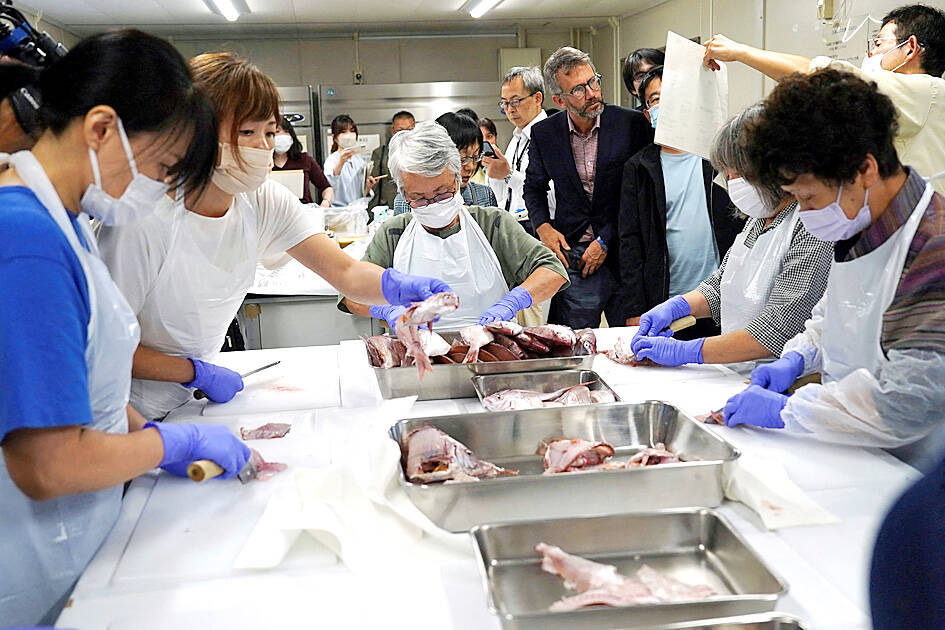The US has started bulk buying Japanese seafood to supply its military there in response to a ban China imposed after Tokyo released treated water from its crippled Fukushima Dai-ichi nuclear power plant into the sea.
Unveiling the initiative in an interview yesterday, US Ambassador to Japan Rahm Emanuel said Washington should also look more broadly into how it could help offset China’s ban that he said was part of its “economic wars.”
China, which had been the biggest buyer of Japanese seafood, says its ban is due to food safety fears.

Local staff prepare crimson sea bream, one of the sample fish from Fukushima, for analysis of radioactivity as a team of experts from the International Atomic Energy Agency observes at Marine Ecology Research Institute in Onjuku, Chiba Prefecture, Japan, on Oct. 20.
Photo: Reuters
The International Atomic Energy Agency vouched for the safety of the water release that began in August from the plant wrecked by a 2011 tsunami. G7 trade ministers on Sunday called for the immediate repeal of bans on Japanese food.
“It’s going to be a long-term contract between the US armed forces and the fisheries and co-ops here in Japan,” Emanuel said.
“The best way we have proven in all the instances to kind of wear out China’s economic coercion is come to the aid and assistance of the targeted country or industry,” he said.
Asked about Emanuel’s comments, Chinese Ministry of Foreign Affairs spokesman Wang Wenbin (汪文斌) said at a news conference in Beijing: “The responsibility of diplomats is to promote friendship between countries rather than smearing other countries and stirring up trouble.”
The first purchase of seafood by the US under the scheme involves just shy of 1 tonne of scallops, a tiny fraction of more than 100,000 tonnes of scallops that Japan exported to mainland China last year.
Emanuel said the purchases — which would feed soldiers in messes and aboard vessels, as well as being sold in shops and restaurants on military bases — would increase over time to all types of seafood.
The US military had not previously bought local seafood in Japan, he said.
The US could also look at its overall fish imports from Japan and China, he said.
The US is also in talks with Japanese authorities to help direct locally caught scallops to US-registered processors.
Emanuel, who was former US president Barack Obama’s White House chief of staff, has in recent months made a series of blunt statements on China, taking aim at various issues, including its economic policies, opaque decisionmaking and treatment of foreign firms.
That has come as top US officials, including Secretary of State Antony Blinken, have visited Beijing in an effort to draw a line under strained ties.
Asked if he considered himself hawkish on China, Emanuel rejected the term and said he was a “realist.”
“I don’t consider it hawkish, but just consider it realist and honest. Maybe the honesty is painful, but it’s honest,” he said.
“I’m all for stability, understanding. That doesn’t mean you’re not honest. They’re not contradictory. One of the ways you establish stability, is that you’re able to be honest with each other,” he said.
He said China faced major economic challenges exacerbated by a leadership intent on turning their backs on international systems.
“The kind of loser in this is the youth of China. You now have a situation where 30 percent of the Chinese youth, one out of three, are unemployed. You have major cities with unfinished housing... You have major municipalities not able to pay city workers. Why? Because China made a political decision to turn their back on a system in which they were benefiting,” he said.
The most recent official youth unemployment data from China, published in July before Beijing said it was suspending publication of the numbers, showed it jumping to a record high of 21.3 percent.
Emanuel said he was also keeping an eye on how China’s leadership responds to the recent death of former Chinese premier Li Keqiang (李克強), a reformist who was sidelined by Chinese President Xi Jinping (習近平).
“What’s ... interesting to me, that I think is telltale, is how they will be treating his funeral and how they’ll be treating comments about him,” he said.
“I do think that there’s kind of a section of China that sees what kind of policies he was pursuing as kind of the best of China. But that’s up for China to decide,” he said.
Source: Taipei Times - 2023/10/31




















